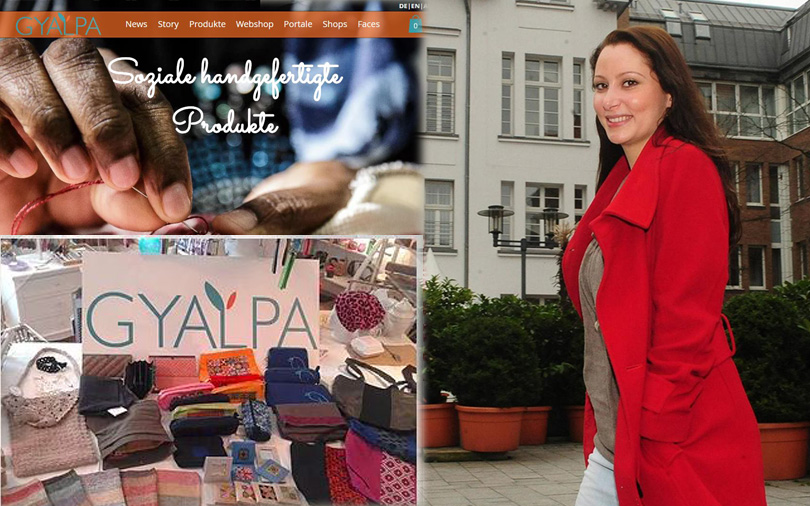Crafts are among the many skills Syrian woman naturally possess, to the extent that these have become a standalone type of art. As such, every woman goes about investing a little bit of her soul, passion and creativity into making shoes, cups, utensils, even interior decorative miniatures, amongst many other crafts. Due to the conflict and destruction in the country coupled with many businesses forced to shut down, Syrian women unearthed a fresh opportunity to demonstrate their work and artisan crafts to make ends meet – under such challenging circumstances – via selling clothes and manually-produced crafts to increase their income resources, even partially.
However, there are challenges that obstruct their advancement in building and operating a business centered on arts, crafts and artisans. These challenges include poor market conditions, difficult logistics and transportation. To resolve these issues and enable Syrian women to achieve a form of financial independence, Lana Idrees launched Gyalpa with the participation of Lina Abou Naboot shared her views on this subject.
Hi Lina, would you talk to us about Gyalpa enterprise?
Welcome everyone! If I were to explain ‘Gyalpa’ in a few words, I would say that its idea is based on buying crafts made by Syrians living locally or abroad, then we resell them in Germany.
The vast majority of those products that we buy – probably 80% – are made by Syrian ladies. The purpose behind such an initiative lies in supporting and enabling women to be financially afloat without the need for inconsequential financial aid. By doing so, they would be productive working women toiling to earn a living in return for the good work they do.
What difficulties have you faced since the outset of such a project?
Lana runs the business side of things in its majority. Nevertheless, I have witnessed some teething problems since the outset manifested in reaching out to those craftspeople. As I told you, we do not produce these goods, but we buy them directly from their makers, which is a difficult task in itself to find the right people and groups. Not to mention that we need products that would appeal to the European market, or probably find that distinctive feature that is not easily found in Europe, while attracting buyers to spend their money on them. Such an endeavour is not to be underestimated due to the differences between both European and Arab cultures.
The second issue we faced was of logistical nature; finding a way to transport products out of Syria into Lebanon, and then export them to us. Transit and customs could amount to a significant expense when there are not enough quantities to be exported. Another challenge is that roads would be completely closed due to an increase in the conflict.
Our entire staff at Gyalpa, including the founders, work relentlessly on making this project a success while running their private businesses on the side, which makes time-management even more challenging, especially since the project is not generating any profit up until the moment. What we are trying to achieve now is turning this into a fully-fledged self-sufficient company whose employees receive salaries as opposed to working voluntarily.
Where do you see yourself 5 years from now?
In addition to our internet sales, we opened our first physical store in Berlin, and we are planning to expand into many other German and European cities as a priority for the few coming years. Such approach would enable us to become a real commercial enterprise based on sustainable social activities based in various countries.
Gyalpa is an initiative not restricted to Syrians only, but there are many other countries worldwide in dire need for similar ideas; and they are on our expansion agenda.
Instead of marketing our products to the European buyers as ‘made by refugees’, we want the customers to discover for themselves the intrinsic quality of the products they like; and consequently, pay a fair price for them. This could be done under a wider promotional umbrella stating that the resulting revenues will be used to support the Syrian society, in particular.
How can the Syrian International Business Association: SIBA help you improve your business?
I believe that SIBA offers a significant opportunity to expand our network and bring entrepreneurs together. Although we live in different countries and we run different businesses, we have many common goals and shared motives that lie first and foremost in supporting the Syrian society and enabling it to rise from under the rubble. There is no better way than building communications bridges between business owners and entrepreneurs to achieve this important goal. SIBA offers support in numerous ways, albeit facilitating communications between entrepreneurs and expanding networking would have sufficed.
On the other hand, forming certain pressure groups lobbying to establish bridges of communications with host countries and governments to facilitate those entrepreneurs’ business affairs so that they initiate projects in their countries by making visa applications concessions and offering work permits in those countries that deny refugees such statuses until a very long time has passed. These are not straightforward conditions as we aspire flexibility and freedom of movement for our staff and working entities alike.
To us, Gyalpa aspires an expanded reach to more people and groups, even producing companies in other countries that we have never done business with before like Egypt or Morocco, for instance. We are quite certain that SIBA will play a major role in that.
How could potential partners, or even clients, communicate with you?
The most straightforward way would be certainly via our website gyalpashop.com where one can find a fillable form to reach out to us.
Thank you Lina for this interesting interview and we wish you all the best in your future endeavors.
Must read: What Expectations Do Female Syrian Entrepreneurs Have of SIBA?

